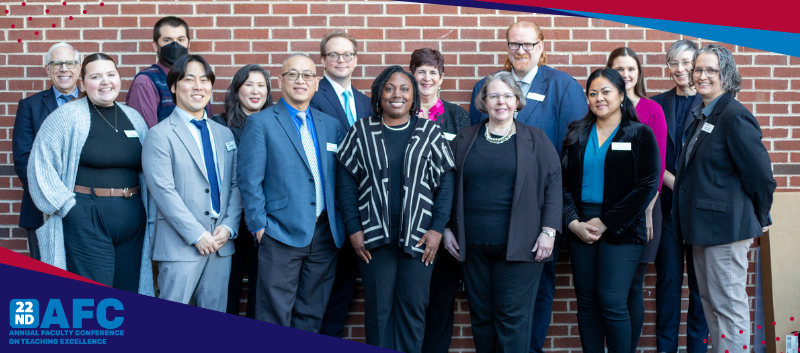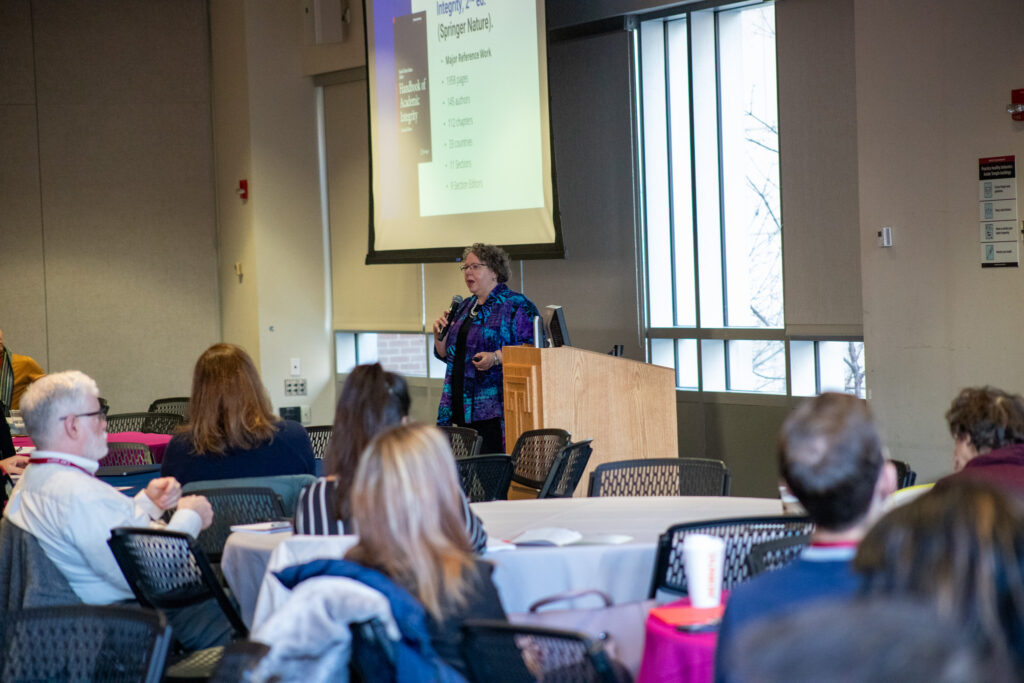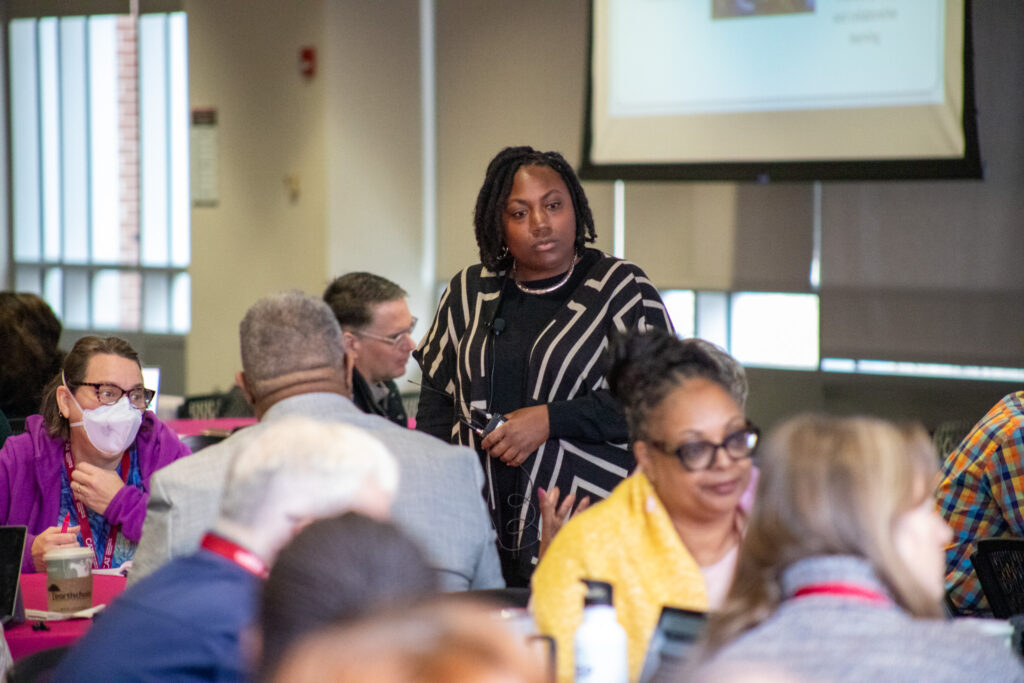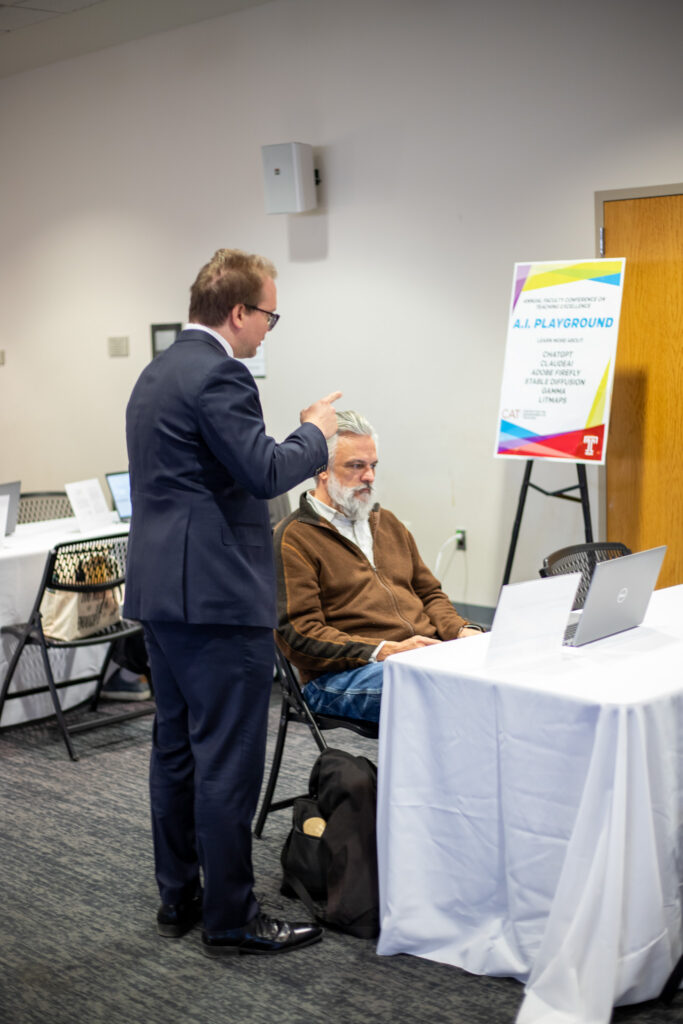Cliff Rouder, EdD

More than 225 faculty from universities across the region came together with the CAT on January 10 and 11 for the 2024 Annual Faculty Conference on Teaching Excellence. The event was co-sponsored by Temple Libraries, the Office of Digital Education, Information Technology Services, and the General Education Program.
This year’s theme was Teaching and Learning in the Age of Generative Artificial Intelligence. Participants grappled with the broad impacts of generative artificial intelligence (GAI) in higher education and the specific implications for teaching and learning–all evolving in real time! The availability of these tools to our students raises important and difficult questions about the nature of thinking and learning, academic integrity, and the purpose and effectiveness of our assessments and learning activities.
Keynote and Plenary Address
Dr. Sarah Elaine Eaton and Dr. Sharla Barry

The CAT was honored to have Dr. Sarah Elaine Eaton, Associate Professor at the Werklund School of Education at the University of Calgary, Canada, who also holds a concurrent appointment as an Honorary Associate Professor at Deakin University in Australia. Her day one keynote was titled, Academic Integrity in a Postplagiarism World: The Impact of Generative Artificial Intelligence on Teaching, Learning, and Assessment.
Dr. Eaton began by defining a post-plagiarism world as an era in human society in which advanced technologies are a normal part of life, including how we teach, learn, and interact daily. After introducing us to the breadth of areas beyond student academic integrity that concern generative AI integrity in higher education, (e.g., publication ethics, research and integrity ethics, instruction ethics, and institutional ethics), she urged us not to approach student academic integrity from a “crime and punishment/I will catch you if you try to cheat” mindset. Rather, she suggested faculty and administrators adopt a more humanist mindset, as cheating is often a symptom of other problems, be it a lack of understanding or trying to handle multiple life responsibilities.
Dr. Eaton then presented some likely realities of a post-plagiarism world, suggesting that some hybrid of human-AI technologies will be the norm, including wearable and implantable AI. Dr. Eaton reminded us that wearable AI is already here as is implantable AI (a cochlear implant), and thus we need to be preemptive rather than speculative in our thinking so that we are not caught off guard as we were with AI/ChatGPT. She stressed that we have an imperative as faculty to ensure the ethical use of future AI to leave the education system better than when we found it, and lastly, that we must also remember that students cannot relinquish their responsibility for what they generate and submit!

We were also delighted to have Dr. Sharla Berry, Associate Director of the Center for Evaluation and Educational Effectiveness at California State University, Long Beach. Her day two plenary session was titled, Teaching with Technology: Holistic Pedagogies in a Time of Change.
Dr. Berry helped us explore the sociocultural implications of our evolving digital learning landscape by posing some thought-provoking questions we need to reflect on regarding the development of AI and its use in education:
- While AI increases our ability to gather information, how are we ensuring that students have the ability to synthesize and use that information to benefit their learning? Is getting the right answer considered learning?
- Are we acknowledging and looking out for historical information from limited perspectives that result in biased output?
- Are we helping students to give better prompts that enable more balanced perspectives?
- What are the environmental impacts of AI? Dr. Berry shared a finding of U. of Massachusetts researchers cited in an MIT report titled Reducing the carbon footprint of artificial intelligence: “The amount of power required for training and searching a certain neural network architecture involves the emissions of roughly 626,000 pounds of carbon dioxide. That’s equivalent to nearly five times the lifetime emissions of the average U.S. car, including its manufacturing.”
- What are the social impacts of AI? Dr. Berry asked us to consider a variety of impacts, such as the substandard hourly wages paid to AI content moderators, the potential for AI to increase loneliness and social isolation, and its potential to enhance social interactions and connections with others.
In sum, Dr. Berry’s primary message was that while there are benefits of AI to humanity and society, there are also costs which need to be considered and addressed as we take a more holistic approach to assessing AI and its impacts
Building on the Keynote and Plenary Address
In addition to keynote and plenary speakers, the conference featured interactive workshops, breakout sessions, lightning talks, and poster sessions–all designed to generate discussion and share ideas for best teaching practices (with and without generative AI).
New this year was our AI Playground where participants tried out these generative AI programs:
- Claude AI (Can be used like ChatGPT; We used it to summarize PDF’s)
- LitMaps (Research based, can explore connections between articles)
- Gamma (Slide creation)
- Stable Diffusion (Image creation)
- Adobe Firefly (Image creation)

Let’s Continue the Conversation
Our 2024 Annual Faculty Conference generated many thought-provoking questions and teaching strategies, so let’s continue talking! Here are some ways you can keep the conversation going:
- Share what you’ve learned with your program/department faculty.
- Avail yourself of the robust AI resources on our website.
- Schedule a consultation with the CAT to work on incorporating what you have learned into your courses.
- Attend CAT workshops and consider joining one of our Faculty Learning Communities.
- Follow us on social media: Instagram, Facebook and Youtube.
- A full album of conference photos can be found on our Facebook!
On behalf of everyone at the CAT, we wish you a joyous new year and a fulfilling spring semester!